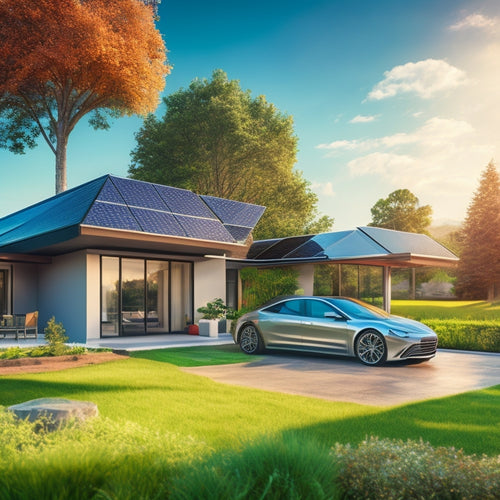
Home Solar Panel and Battery Kits for Energy Efficiency
Share
You're considering a home solar panel and battery kit to reduce your energy bills and carbon footprint, and that's a great step towards energy efficiency. By utilizing sunlight and storing excess energy, you can decrease your reliance on the grid and lower your energy costs. A well-designed system requires an assessment of your energy needs, proper battery sizing, and ideal installation. With the right setup, you can enjoy increased energy independence, lower your environmental impact, and even provide backup power during outages. As you investigate the world of solar energy, you'll uncover more ways to enhance your system for maximum efficiency.
Key Takeaways
- Solar panel systems convert sunlight into electrical energy, reducing reliance on the grid and promoting energy efficiency.
- Home battery kits store excess energy generated by solar panels, allowing for increased energy independence and reduced energy bills.
- Properly sizing a home battery kit is crucial, considering daily energy needs, usage patterns, and battery chemistry to ensure efficient energy storage.
- Regular performance checks and maintenance are essential to optimize energy output, identify potential issues, and extend the lifespan of solar panel and battery kits.
- Transitioning to solar energy can provide substantial cost savings, tax credits, and government incentives, making it a viable option for energy efficiency and sustainability.
Understanding Solar Panel Systems
When it comes to utilizing renewable energy, solar panel systems have become an increasingly popular choice for homeowners. You're likely contemplating joining the ranks of those who've made the switch to solar technology.
But before you do, it's crucial to understand how these systems work. Solar panel systems convert sunlight into electrical energy through photovoltaic (PV) cells. These cells are made from semiconducting materials that release electrons when exposed to sunlight, generating an electrical current.
As you investigate solar technology, you'll want to evaluate your energy needs and how a solar panel system can help you achieve energy independence. You'll need to assess your energy consumption, considering factors like your home's size, location, and energy usage patterns.
This will help you determine the number of solar panels required to meet your energy needs. With a well-designed solar panel system, you can reduce your reliance on the grid and enjoy the benefits of renewable energy.
Benefits of Home Battery Kits
Embracing renewable energy with a solar panel system is just the first step; to truly harness the power of solar energy, you'll want to contemplate pairing it with a home battery kit. This integration enables you to store excess energy generated by your solar panels during the day for later use, reducing your reliance on the grid.
With a home battery kit, you'll experience increased energy independence, as you'll be able to power your home even when the sun isn't shining.
Moreover, home battery kits have a significant environmental impact. By storing excess energy, you'll reduce the amount of energy wasted and lower your carbon footprint.
You'll also decrease your energy bills, as you'll be using stored energy instead of relying on the grid. Additionally, home battery kits provide backup power during outages, ensuring your home remains powered and your critical appliances continue to function.
How Solar Panels Generate Energy
Most solar panels are composed of numerous small photovoltaic (PV) cells, which convert sunlight into electrical energy through a process known as photovoltaics.
When you install a solar panel system, you're utilizing the power of solar energy to generate electricity for your home.
The PV cells absorb sunlight, triggering an energy conversion process that produces a direct current (DC) electrical output.
This DC power is then inverted into an alternating current (AC) that's compatible with your home's electrical system.
As a result, you can power your appliances, lights, and devices using clean, renewable energy.
Choosing the Right Battery Size
Now that you've harnessed the power of solar energy to generate electricity, it's time to reflect on how to store excess energy for later use. Choosing the right battery size is vital to guarantee you can meet your energy demands when the sun isn't shining.
To determine the ideal battery size, you'll need to take into account your usage patterns, energy demands, and load analysis. This involves calculating your daily energy requirements and factoring in your solar panel's output.
Battery chemistry also plays a role, as different types have varying capacities and discharge rates. Lifespan considerations are also important, as you'll want a battery that can withstand the rigors of daily charging and discharging.
Sizing guidelines typically recommend a battery with a capacity that's 1-2 times your daily energy needs. By following these guidelines and evaluating your unique energy profile, you can select a battery that effectively stores excess energy for later use.
Installation and Maintenance Tips
When setting up your home solar panel and battery kit, you'll want to make certain proper system configuration to maximize energy production and storage.
You'll need to take into account factors like panel orientation, battery type, and charging protocols to create an efficient system.
Regularly checking your system's performance will also be essential to identify potential issues and optimize energy output.
System Configuration Essentials
Your home solar panel and battery kit's system configuration is essential to its overall performance and longevity. When designing your system, you'll need to take into account the specific components and how they'll work together to provide reliable energy storage.
You'll want to verify that your system components are compatible and properly sized for your energy needs. This includes selecting the right solar panels, inverters, and energy storage solutions. For example, you may choose to install a hybrid inverter that can manage both grid-tied and off-grid energy storage.
Proper system configuration also involves optimizing energy storage. You'll need to determine the ideal battery size and type based on your energy requirements and available space.
Additionally, you should take into account the charge and discharge rates, as well as the depth of discharge, to confirm your batteries last as long as possible. By carefully configuring your system, you can maximize its efficiency, reduce energy waste, and enjoy a reliable source of power.
Ongoing Performance Checks
Regular system inspections and maintenance are essential to guaranteeing your home solar panel and battery kit operates at peak performance and lasts for its intended lifespan.
You'll want to perform routine checks to identify and address any potential issues before they become major problems. This includes monitoring your system's performance to guarantee it's generating the expected amount of power.
You can do this through performance monitoring software, which provides real-time data on your system's energy production.
Cost Savings and Incentives
One of the most notable advantages of investing in a home solar panel and battery kit is the potential for substantial cost savings. You can greatly reduce your energy bills by generating your own clean energy and storing excess energy in your battery for later use.
In addition, you may be eligible for tax credits and government incentives, which can help offset the initial installation costs. Financing options are also available to make the shift to solar energy more affordable.
In the long term, you'll enjoy considerable savings on your energy bills, and you may even be able to sell excess energy back to the grid, earning you utility rebates.
Moreover, by reducing your reliance on fossil fuels, you'll be minimizing your environmental impact. With a solar panel and battery kit, you're not only saving money, but also contributing to a cleaner, more sustainable future.
Frequently Asked Questions
Can I Use Solar Panels With My Existing Electrical System?
You can integrate solar panels with your existing electrical system if they're compatible; verify your system meets the solar panel's voltage and current requirements, and consult an electrician to confirm a safe, efficient electrical system integration.
Are Solar Panels Resistant to Extreme Weather Conditions?
You'll be impressed to know that 90% of solar panels last up to 30 years or more. Rest assured, you're investing in a durable technology, as solar panels are designed to withstand extreme weather conditions, showcasing extraordinary resilience in the face of heavy rain, hail, and scorching heat.
Can I Install Solar Panels on a Metal Roof?
You can install solar panels on a metal roof, leveraging its advantages like durability and ease of installation. However, consider factors like roof slope, material type, and structural integrity to guarantee a secure and efficient installation.
Do Solar Panels Require Regular Cleaning for Efficiency?
As you bask in the sunlight, remember that dust and debris can cast a shadow on your solar panel's performance; regular cleaning is essential, and perfecting advanced cleaning techniques will help you utilize maximum energy, ensuring your system shines bright.
Can I Sell Excess Energy Back to the Grid?
You can sell excess energy back to the grid through net metering benefits, where you're credited for excess energy produced, or participate in energy buyback programs, allowing you to offset your energy bills or even earn revenue.
Related Posts
-

What Solar Panels Work Best With EVS Online?
When shopping for solar panels online to power your electric vehicle, look for high-efficiency models that can withst...
-

Why Higher Upfront Costs Are Worth It
You pay a premium for high-quality, energy-efficient products, but they're worth it. With durability testing ensuring...
-

10 Best Ways to Purify Urban Air With EVS
You're looking for ways to purify urban air with Electric Vehicles (EVs). You can start by incorporating EVS Air Filt...


